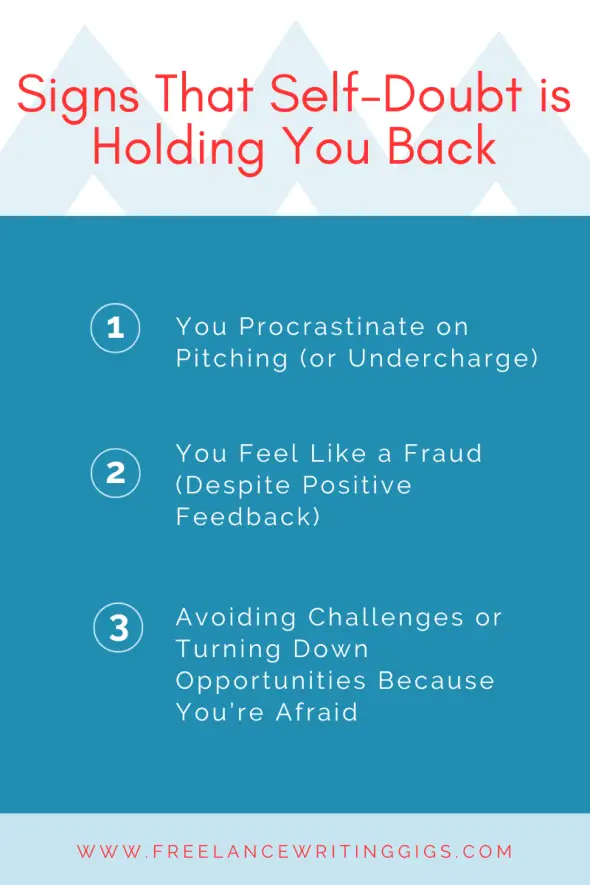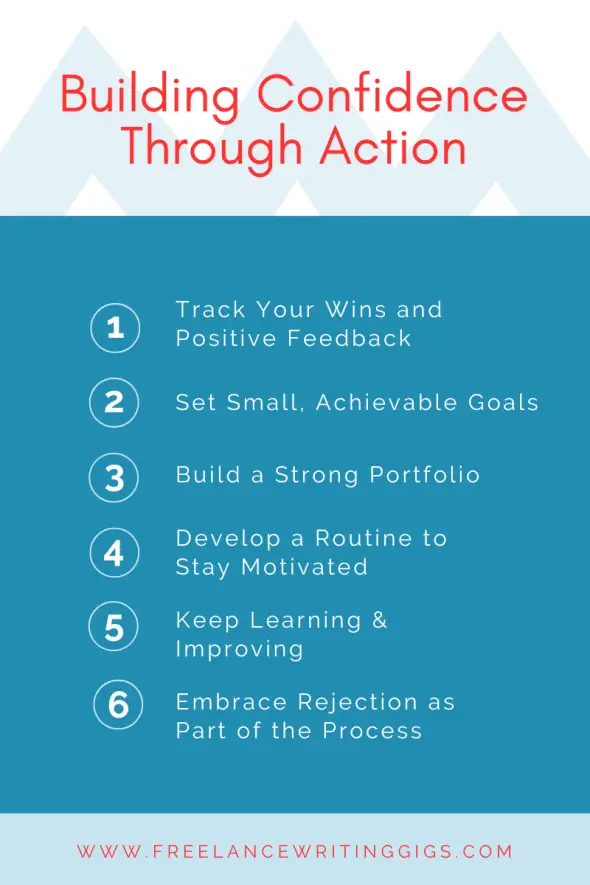“Am I Cut Out for This?”—How to Overcome Freelance Self-Doubt
Do you ever worry that you’re just not cut out to be a freelancer? Maybe you’re questioning whether you’re really cut out to be a freelancer. Perhaps a client had negative feedback, or you didn’t land any of the gigs you pitched, or you seem to be stuck in the “feast or famine” cycle. Self-doubt […] The post “Am I Cut Out for This?”—How to Overcome Freelance Self-Doubt appeared first on Freelance Writing Jobs.

Do you ever worry that you’re just not cut out to be a freelancer?
Maybe you’re questioning whether you’re really cut out to be a freelancer. Perhaps a client had negative feedback, or you didn’t land any of the gigs you pitched, or you seem to be stuck in the “feast or famine” cycle.
Self-doubt is a reality for many freelance writers. We’re going to take a look at why, before covering some key signs that self-doubt might be holding you back. Then, we’ll look at practical steps you can take to build your confidence and overcome self-doubt.
Why Do Freelancers Experience Self-Doubt?
Lots of writers—even very well-established writers—experience self-doubt and a lack of confidence.
While freelancers won’t have the exact same struggles as, say, novelists, the pressure to make money writing can be a huge confidence hurdle.
Your self-doubt might come from:
- Having a wildly inconsistent income. Maybe you made $4,000 last month but only $2,000 this month. That’s stressful—especially if you’re the sole or main earner in your family.
- Comparing yourself with other freelancers. Let’s face it, there’s always going to be someone on LinkedIn talking about the amazing new gig they’ve just landed with that dream publication of yours. It’s hard not to end up doubting yourself.
- Struggling with the unpredictable nature of freelance work. It’s not just about the money: the types of things you’re writing about (and the type of writing you’re doing) might change from week to week. Perhaps your client wants an article on a topic that’s completely new to you … and you’re worried your research skills won’t cut it.
- Not having any external validation. Many freelancers love the freedom of not having a boss or line manager—but that also means no one’s telling you how you’re doing. Even if clients offer feedback, it may be very brief (“great job”) or even contradictory.
Tip: If one of these factors resonates with you, is there a step you could take to mitigate it? For instance, if you’re having a slow month and you’re worried about your lack of freelancing income, maybe you could start a side hustle that could provide an additional revenue stream during lean months.
Signs That Self-Doubt is Holding You Back
Perhaps you feel like you’re doing okay despite your feelings of self-doubt. You’ve got freelance clients, after all—and you’re making money.
Here are three subtle signs that self-doubt might be holding you back more than you realize.

You Procrastinate on Pitching (or Undercharge)
Do you find yourself shortlisting gigs that look like a good fit for you … only to put off applying until the last possible minute? Perhaps you even let the deadline pass, because you’re deep-down convinced that you won’t land that gig.
Or if you are pitching, perhaps you’re charging less than you could because you’re secretly not convinced anyone would pay you a good professional rate.
You Feel Like a Fraud (Despite Positive Feedback)
Clients rave about your work. They regularly say how lucky they are to work with you, or how fantastic your writing is.
And yet … you still feel like a fraud. To you, it feels like what you’re doing is nothing special. So despite this great feedback, you rarely or never increase your rates.
Avoiding Challenges or Turning Down Opportunities Because You’re Afraid
Have you ever looked at an amazing gig—and immediately ruled it out? Perhaps it involved something challenging that you hadn’t done before, like interviewing people as part of the research. Maybe it was for a higher-profile publication than you’d ever pitched before.
If you’re avoiding anything outside your comfort zone, self-doubt is holding you back from reaching your full potential as a freelancer.
Building Confidence Through Action
You aren’t stuck with self-doubt—it’s absolutely something you can overcome. Here’s how.

1. Track Your Wins and Positive Feedback
First, keep track of what you’re doing well (and nice things your clients say). That might be things like:
- Sent 3 pitches this week
- Landed a new writing gig
- Client loved the article and said I’d captured their voice perfectly
- My LinkedIn post got attention from three blog editors
This isn’t just about making yourself feel good. As Peter Čuček, Owner of Tuuli, points out:
“Positive feedback is a brilliant signal about what your audience (that’s your clients) wants from you. This lets you know what to do more of and how to position yourself in the market.”
2. Set Small, Achievable Goals
What’s your next small milestone as a freelancer? You might want to think about goals like:
- Increasing how much billable work you do, on average, month by month
- Bringing on board one new regular client
- Getting some experience with a new type of writing (e.g. copywriting if you’ve only ever written content)
- Raise your rate for one existing client
3. Build a Strong Portfolio
You want to be able to show off your best pieces to prospective clients, so make sure you’re taking on work to build a great portfolio. If you don’t yet have any clients, write some “sample” pieces to use instead.
4. Develop a Routine to Stay Motivated
You can freelance in your PJs, at any time of the day (or night) … but while this flexibility is great, most freelancers find it’s easier to stay motivated when they’re in a routine. You might want to stick to roughly the same work hours each day, for instance.
Think about how you organize your freelance life, too. For instance, you might want to use project management tools to help you juggle multiple client projects and deadlines or invoicing software to manage payments efficiently.
5. Keep Learning & Improving
Is there a new type of writing you’d like to learn? Or is there a techy skill that would help you make more money? (E.g. if you’re writing content, clients might pay more if you can upload and format it in WordPress for them.)
If you feel daunted by technology, there are loads of tutorials and courses out there (many of them free). There are also lots of tools to help you avoid any really big problems, too. As Stanislav Khilobochenko, VP of Customer Services at MacKeeper explains:
“The last thing you want as a freelancer is to have your computer out of action with a virus. It’s not just an inconvenience when it’s your livelihood! Make sure you’re running high-quality anti-virus and malware-detection software, ideally along with tools to improve your computer’s performance (speeding it up and clearing out junk).”
6. Embrace Rejection as Part of the Process
It’s always going to sting a little to apply for a gig and not land it. But rejection is just part of life as a freelancer.
Keep track of your rejection/acceptance rates. Maybe you’re landing 1 or 2 out of every 10 you pitch to. Once you know that, it’s easier to push yourself forward: apply to 20 gigs and you’ll likely land at least 2 of them.
Trust Yourself and Keep Going
Your clients trust you: they wouldn’t be paying for your work if they didn’t! So try to trust yourself too. You are a good writer—and you’re doing a great job as a freelancer.
All you need to do is keep going. Look for the next step forward, even if that’s something tiny (like updating the “About” page on your website). There’s always something you can do to make forward progress.
The freelance life can feel lonely and difficult at times. It’s normal to struggle with feelings of self-doubt. The important thing is to not let those feelings take over. Instead, try some of the practical ideas above to build your confidence—and to build a thriving freelancing career.
You got this!  Read More
Read More


































































![https //g.co/recover for help [1-866-719-1006]](https://newsquo.com/uploads/images/202506/image_430x256_684949454da3e.jpg)
























![How Smart PMs Scale Their Careers in Any Org [TPG Live Recap]](https://tpgblog.com/wp-content/uploads/2025/06/2025-06-12-thumbnail-action.png?#)
















































